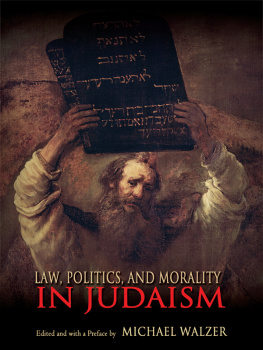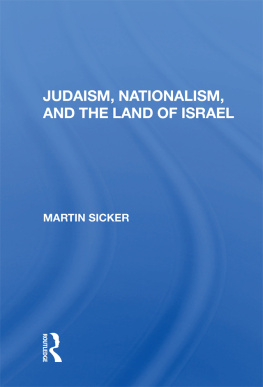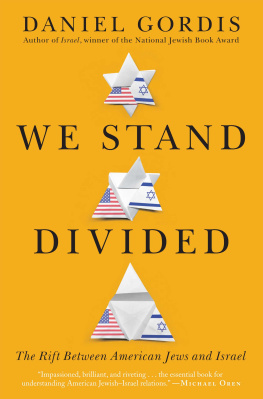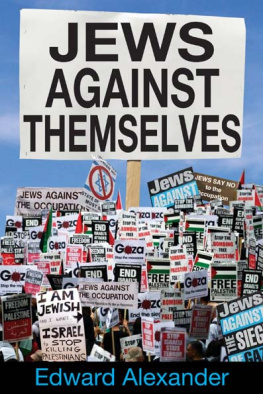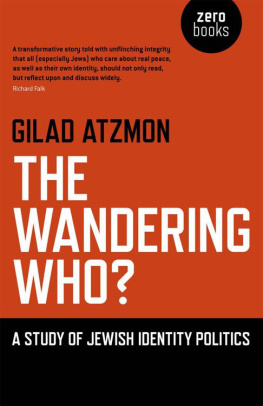LAW, POLITICS, AND MORALITY IN JUDAISM

The Ethikon Series publishes studies on ethical issues of current importance. By bringing scholars representing a diversity of moral viewpoints into structured dialogue, the series aims to broaden the scope of ethical discourse and to identify commonalities and differences between alternative views.
TITLES IN THE SERIES
Brian Barry and Robert E. Goodin, eds.
Free Movement: Ethical Issues in the Transnational Migration
of People and Money
Chris Brown, ed.
Political Restructuring in Europe: Ethical Perspectives
Terry Nardin, ed.
The Ethics of War and Peace: Religious and Secular Perspectives
David R. Mapel and Terry Nardin, eds.
International Society: Diverse Ethical Perspectives
David Miller and Sohail H. Hashmi, eds.
Boundaries and Justice: Diverse Ethical Perspectives
Simone Chambers and Will Kymlicka, eds.
Alternative Conceptions of Civil Society
Nancy L. Rosenblum and Robert Post, eds.
Civil Society and Government
Sohail Hashmi, ed.
Foreword by Jack Miles Islamic Political Ethics: Civil Society, Pluralism, and Conflict
Richard Madsen and Tracy B. Strong, eds.
The Many and the One:
Religious and Secular Perspectives on Ethical Pluralism in the Modern World
Margaret Moore and Allen Buchanan, eds.
States, Nations, and Borders: The Ethics of Making Boundaries
Sohail H. Hashmi and Steven P. Lee, eds.
Ethics and Weapons of Mass Destruction: Religious and Secular Perspectives
Michael Walzer, ed.
Law, Politics, and Morality in Judaism
LAW, POLITICS, AND MORALITY
IN JUDAISM
EDITED AND WITH A PREFACE
BY Michael Walzer
PRINCETON UNIVERSITY PRESS
PRINCETON AND OXFORD
Copyright 2006 by Princeton University Press
Published by Princeton University Press, 41 William Street, Princeton, New Jersey 08540
In the United Kingdom: Princeton University Press, 3 Market Place, Woodstock,
Oxfordshire
OX20 1SY
Requests for permission to reproduce material from this work should be sent to Permissions, Princeton University Press.
All Rights Reserved
Library of Congress Cataloging-in-Publication Data
Law, politics, and morality in Judaism / edited and with preface by Michael Walzer.
p.cm. (Ethikon series in comparative ethics)
Includes bibliographical references (p. ) and index.
eISBN: 978-1-40082-720-6
1. Jewish lawMoral and ethical aspects. 2. Public law (Jewish law)
3. Judaism and state. 4. LawIsraelJewish influences. I. Walzer, Michael.
II. Series.
KBM524.14.L39 2006
296.3'6dc22 2005051468
British Library Cataloging-in Publication Data is available
This book has been composed in Palatino
Printed on acid-free paper.
pup.princeton.edu
Printed in the United States of America
10 9 8 7 6 5 4 3 2 1
Contents
Michael Walzer
POLITICAL ORDER AND CIVIL SOCIETY
Obligation: A Jewish Jurisprudence of the Social Order
Robert M. Cover
Judaism and Civil Society
Suzanne Last Stone
Civil Society and Government
Noam J. Zohar
Autonomy and Modernity
David Biale
TERRITORY, SOVEREIGNTY, AND
INTERNATIONAL SOCIETY
Land and People
David Novak
Contested Boundaries: Visions of a Shared World
Noam J. Zohar
Diversity, Tolerance, and Sovereignty
Menachem Fisch
Responses to Modernity
Adam B. Seligman
Judaism and Cosmopolitanism
David Novak
WAR AND PEACE
Commanded and Permitted Wars
Michael Walzer
Prohibited Wars
Aviezer Ravitzky
Judaism and the Obligation to Die for the State
Geoffrey B. Levey
I
Preface
MICHAEL WALZER
THERE ARE TWO MODERN ANSWERS to what used to be called the Jewish question. I mean, two humane answers; we wont be talking in this volume about the other kind. The question itself might be phrased as follows: What political space is there for Jews in the modern world? The first answer points toward citizenship in inclusive democratic states; the second answer points toward sovereignty in the land of Israel.
Both of these answers have now been realized; the process of emancipation brought Jews into the democratic state as equal members; a vote at the United Nations and a war for independence brought Jews a state of their own. These two achievements now require the revision and renewal of Judaism generally and of Jewish legal and moral dis-course (halakah) in particular. For Judaism and its halakah are essentially the products of exile and exclusion. They reflect the experience of being ruled by the others. They are shaped by a long and difficult adaptation to the harsh realities of homelessness. Now they must be reshaped to accommodate two different ways of being at home in the political world.
It is the normative system, the halakic order, that most requires revision and renewal. The resources available for this work are manifold: first of all, the long tradition of legal interpretation and controversy, and then the history of the Jews, the practice of ethical storytelling (aggadah), theological reflection, and, finally, secular philosophy. Interpretation has always been the dominant strategy of Jewish legal innovation, and many of our authors explore its uses here, but it is important to insist on the other possibilities also. In this volume, David Novak argues for the importance of theology, and Menachem Fisch for secular philosophy. As Maimonides appropriated Aristotle, so Fisch appropriates Karl Popper, it is a useful model.
The stress in all these essays is more on making the tradition usable (though some of our authors insist on the difficulties of doing that) than on learning from the tradition. There is, indeed, a lot to learn from the Jewish experience of sustaining a national identity and a common law without territory, sovereignty, citizenship, or, most of the time, coercive power. Some of that learning is visible here, but what is mostly on display in these essays is the effort to find features of Jewish experience that might be useful in thinking about how to live as citizens and sover-eigns. The point is not to negate the exile, as the first generation of Zionist writers wanted to do, but rather to pull exilic Judaism into the world of modern democracy. Whatever the value of medieval and early modern communal life, it was a sharply segregated life, and it did not prepare the Jews for two crucial features of modern citizenship and statehood. The first of these is voluntary association, where Jews and non-Jews coexist in civil society, with Jewish groups operating side by side with Christian, Muslim, and secular groups, all under the same set of rulesand where individual Jews and non-Jews often join together in the same association for some common purpose. The second feature of modern politics for which exile did not prepare the Jews is democratic responsibility: the sense of being committed, along with non-Jewish fellow citizens, to the well-being of the commonwealthresponsible for the others as they are for you. The kahal, the semiautonomous Jewish community of the exile, was radically homogeneous. In it, Jews were responsible only for their own well-being. They were denied any share in the larger political community and any role in its decision-making; there were a small number of Jewish ministers and even generals (in medieval Spain, for example), but the Jews generally were a pariah community. The common good belonged to the others, who of-ten looked after it very badly, but who had at least some sense that it needed looking after. Jews today, in Israel especially, but also in every democratic setting, need to revise exilic law and moral sensibility so as to accommodate the idea of an extended common good.
Next page
